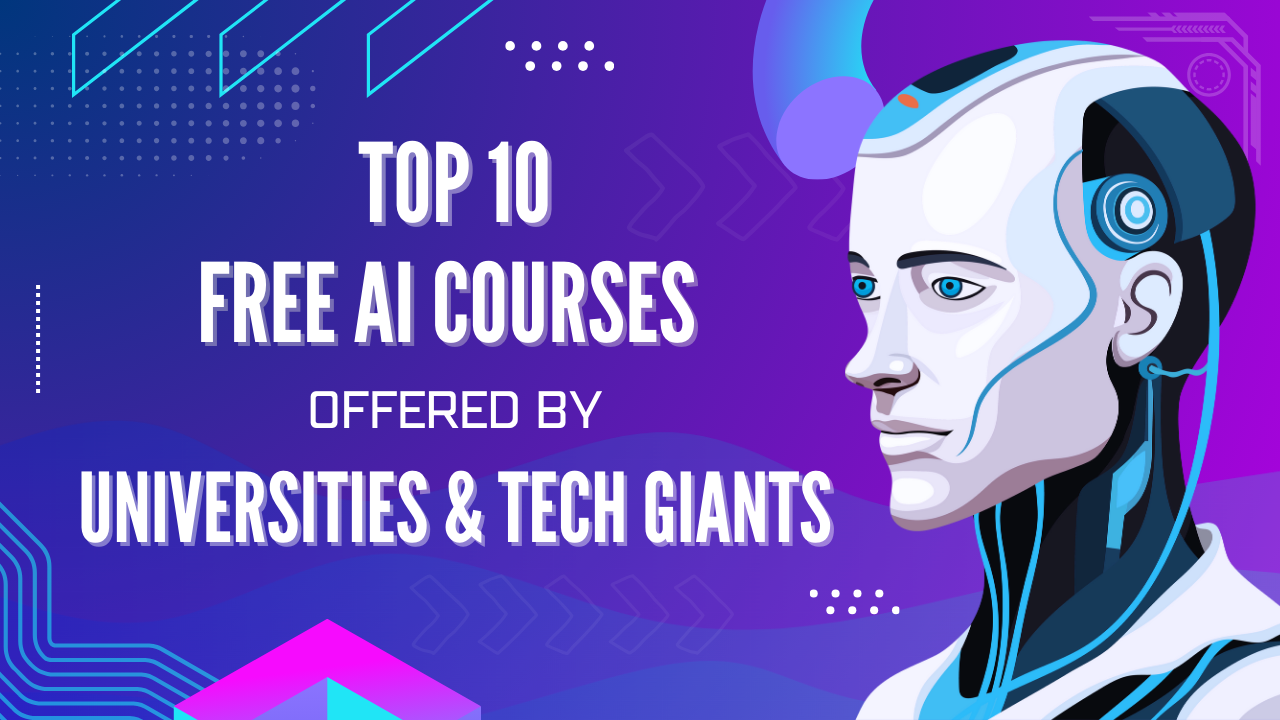Ever wondered what makes virtual assistants work like Siri or Alexa? Or is the world around us being transformed by advanced robotics and smart technologies? The heart of these innovations is Artificial Intelligence (AI), and the increase in its growth has created an exponentially widening gap for people who can leverage it. With AI driving the future of industries and businesses, there has never been a better time for companies to hire skilled professionals who can leverage this transformation.
Artificial intelligence is already being used to change a huge amount of industries from healthcare, to finance, and even technology. Imagine doctors using AI-powered tools to diagnose diseases with higher accuracy in less time, or financial institutions detecting fraudulent behavior before it even occurs based on better algorithms. These examples highlight just how important AI has become in modern industries, making AI education not just a plus point but a necessity for anyone looking to thrive in these sectors.
So, why should you learn AI? The answer is quite simple: opportunity. AI is essential for every sector from AI engineers to Data Scientists, and the demand for an expert in AI is increasing fast. Learning AI does not just allow you the possibility of getting a highly-paid job but it also gives you critical problem-solving skills that are valuable in any industry. Learning about AI is not just an issue of staying competitive — it’s preparing yourself for a world surrounded by smart and innovative technologies.
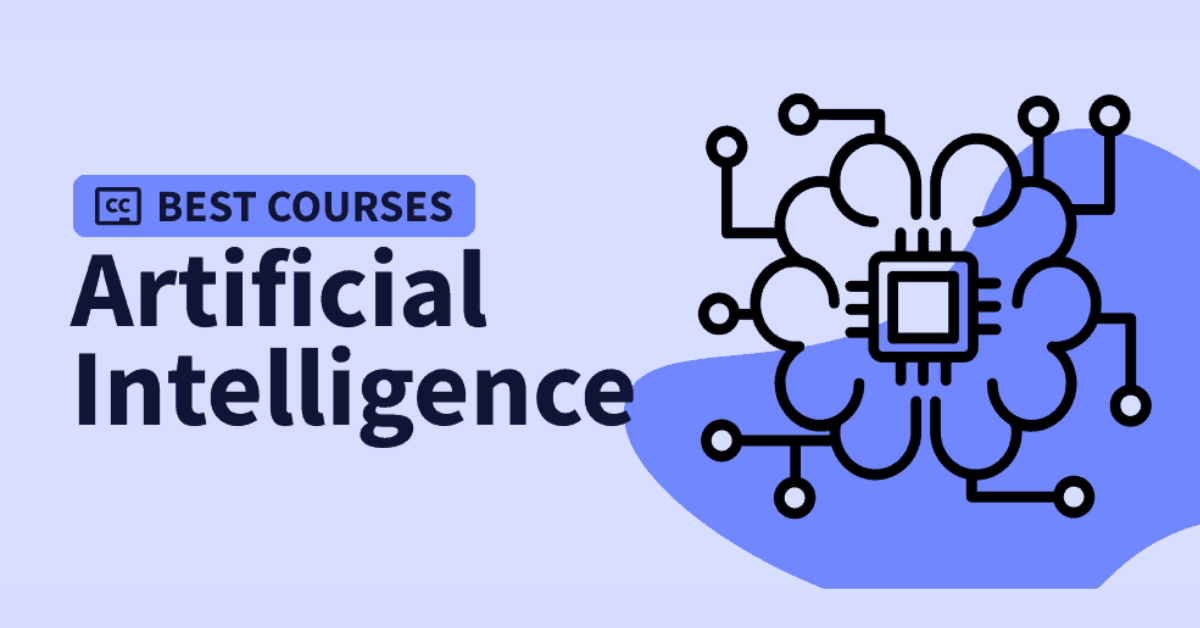
1. Overview of Free AI Courses
Unlock Your Potential with Free AI Courses!
Do you know that the best universities such as Stanford or even tech industry titans like Google and IBM provide free AI courses. If you are a novice, expert or just plain curious about AI this is the best time to get started. These courses include entry-level to advanced level content on AI, machine learning and data science.
The best advantage of the online courses is that you can manage these at your own convenience. These are designed so that you can learn at your own speed, from anywhere — meaning any tight scheduled person should be able to access them. Now is the time to polish up those skills and maybe even discover a new pathway in this ever-encompassing tech world with these free AI courses.
2. Top 10 Free AI Courses
1. Big Data, Artificial Intelligence, and Ethics by University of California (Coursera).
- Institution: University of California
- Key Topics: Big data, AI ethics, data privacy, and AI governance.
- Duration: 6 weeks
- Description: This course dives into the ethical challenges surrounding AI and big data, covering data privacy and responsible AI practices, ideal for learners interested in the intersection of AI and society.
- Format: Video lessons, readings, and quizzes.
- Certification: Available upon completion for a small fee.
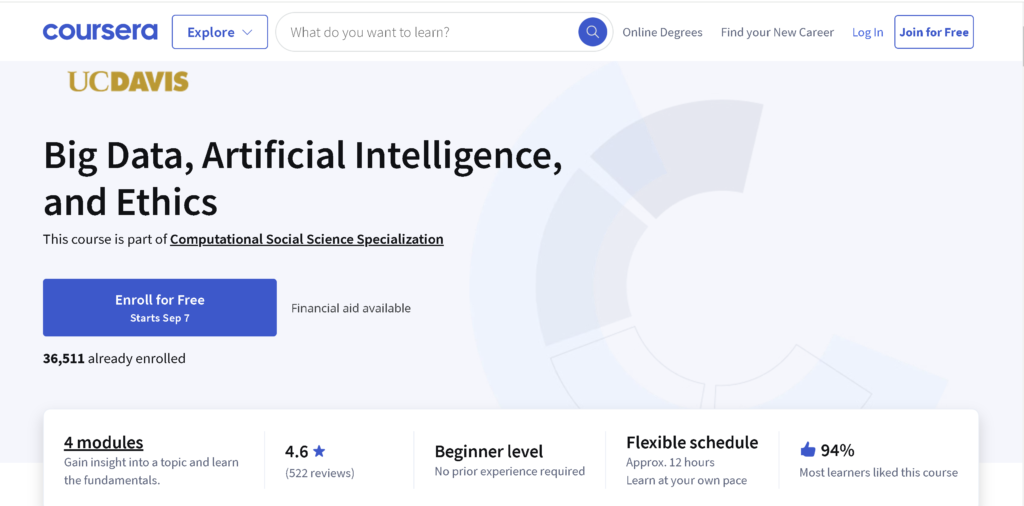
2. Artificial Intelligence Courses by Harvard University.
- Institution: Harvard University
- Key Topics: Robotics, natural language processing (NLP), machine learning.
- Duration: Self-paced
- Description: Harvard’s AI course series covers a range of topics, from robotics to NLP, offering insights into the current advancements in AI. It’s a comprehensive and flexible program for learners at all levels.
- Format: Video lectures, interactive quizzes, and projects.
- Certification: A certificate is available after course completion for a fee.
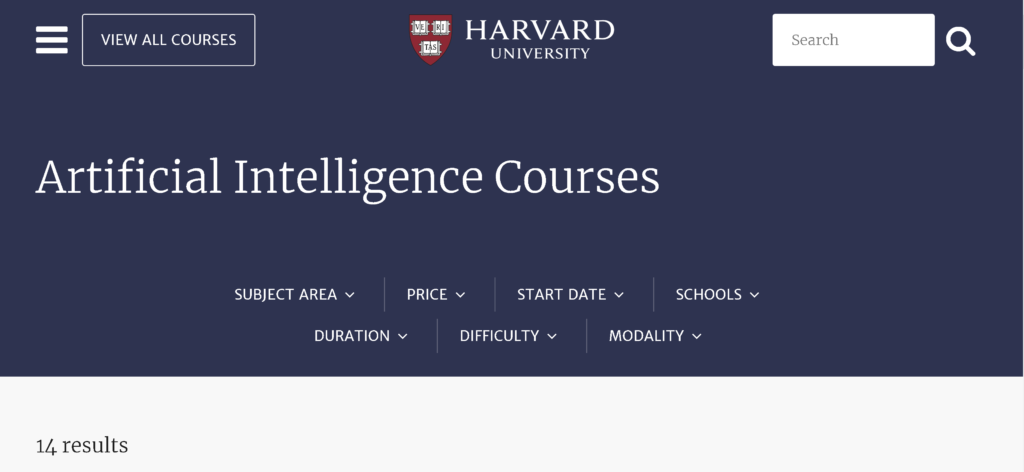
3. Machine Learning Specialization by Stanford University.
- Institution: Stanford University
- Key Topics: Supervised learning, unsupervised learning, and neural networks.
- Duration: 3 months
- Description: One of the most comprehensive AI programs, Stanford’s Machine Learning Specialization covers both foundational and advanced machine learning techniques. Taught by Andrew Ng, it offers practical knowledge for building AI models.
- Format: Videos, readings, projects, and assignments.
- Certification: A verified certificate is available upon completion.
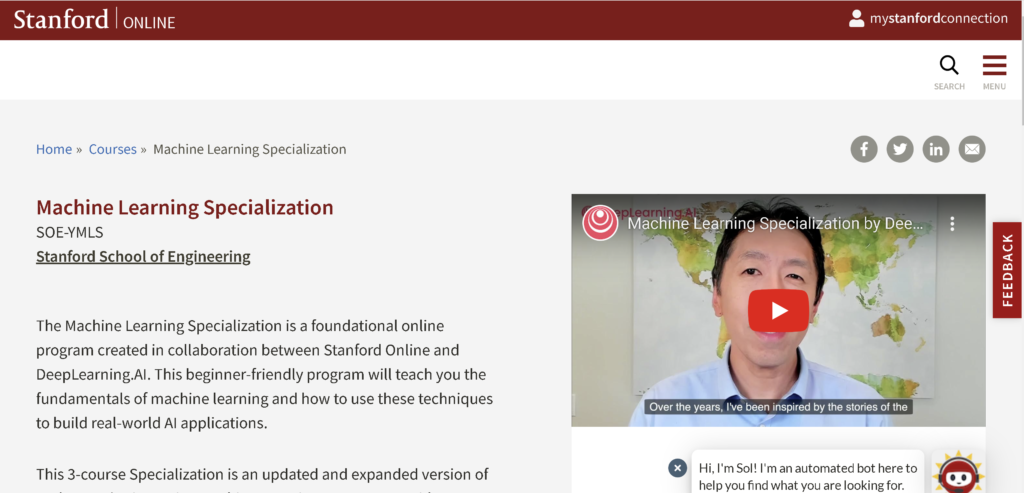
4. Artificial Intelligence Course by MIT.
- Institution: MIT
- Key Topics: Machine learning, neural networks, and deep learning.
- Duration: 4 weeks
- Description: This introductory course from MIT covers core concepts in AI, including neural networks, data analysis, and machine learning techniques. It provides a great foundation for those looking to explore AI in-depth.
- Format: Video lectures, projects, and quizzes.
- Certification: A verified certificate is available for a fee after completing the course.
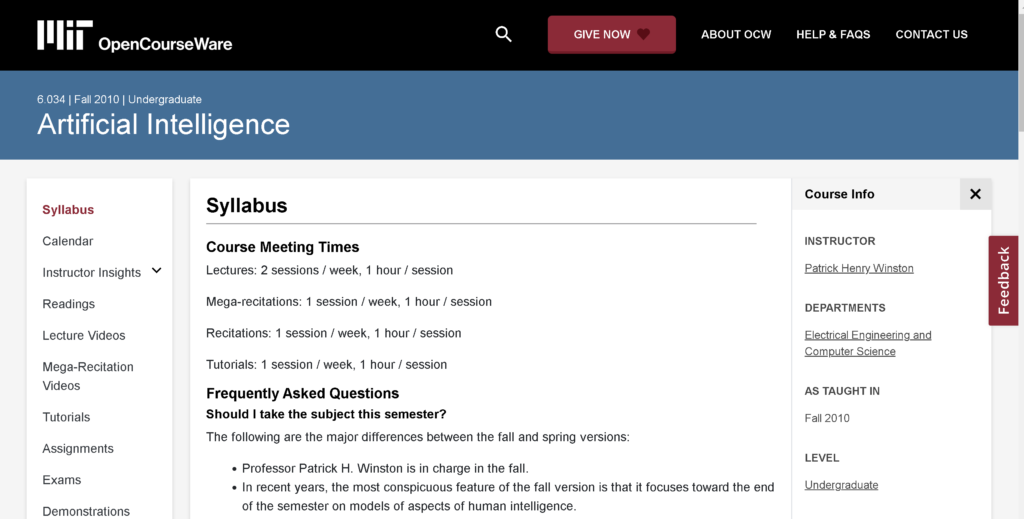
5. Machine Learning Foundations by University of Washington (Coursera).
- Institution: University of Washington
- Key Topics: Algorithms, data science, and AI programming.
- Duration: 6 weeks
- Description: This course focuses on the foundational concepts of machine learning, helping students understand data analysis techniques and AI programming. It’s a great starting point for anyone looking to build AI skills.
- Format: Video lessons, projects, and quizzes.
- Certification: Available for a nominal fee after completing the course.
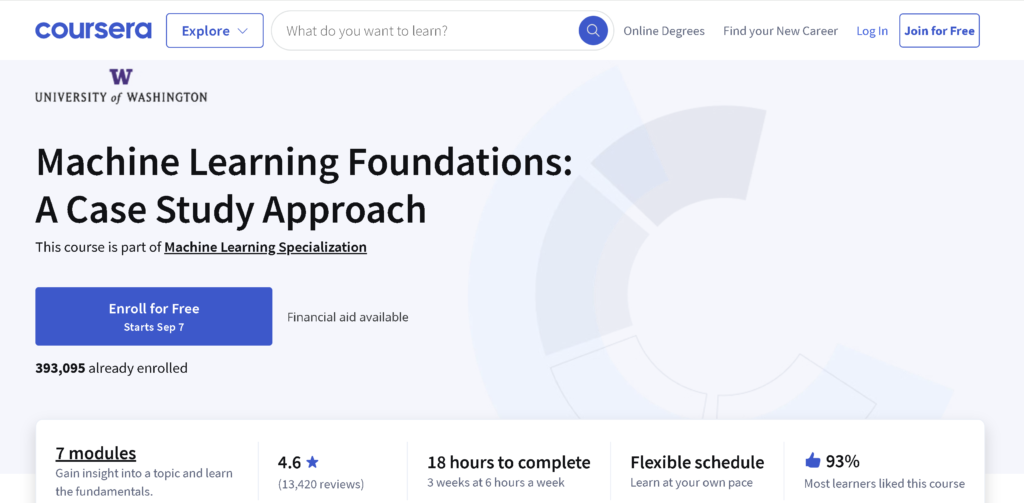
6. Artificial Intelligence by Georgia Institute of Technology (Udacity).
- Institution: Georgia Institute of Technology
- Key Topics: AI algorithms, search, and optimization techniques.
- Duration: 4 months
- Description: Georgia Tech’s AI course provides an in-depth look at AI algorithms and their real-world applications. Students learn about optimization techniques and how to apply AI to solve complex problems.
- Format: Video lectures, quizzes, and projects.
- Certification: A certificate of completion is available for a fee.
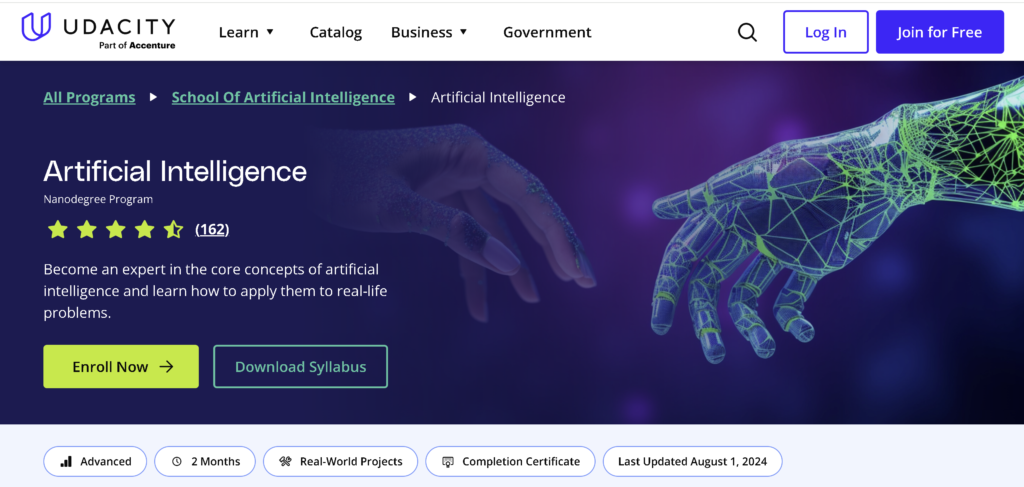
7. AI for Anyone Course by Google.
- Institution: Google
- Key Topics: AI basics, machine learning, and data science principles.
- Duration: 2 hours
- Description: Aimed at beginners, this course introduces the basic concepts of AI and machine learning, with no prior technical knowledge required. It’s a great entry point for anyone curious about AI.
- Format: Short video lessons and quizzes.
- Certification: No formal certification is offered.
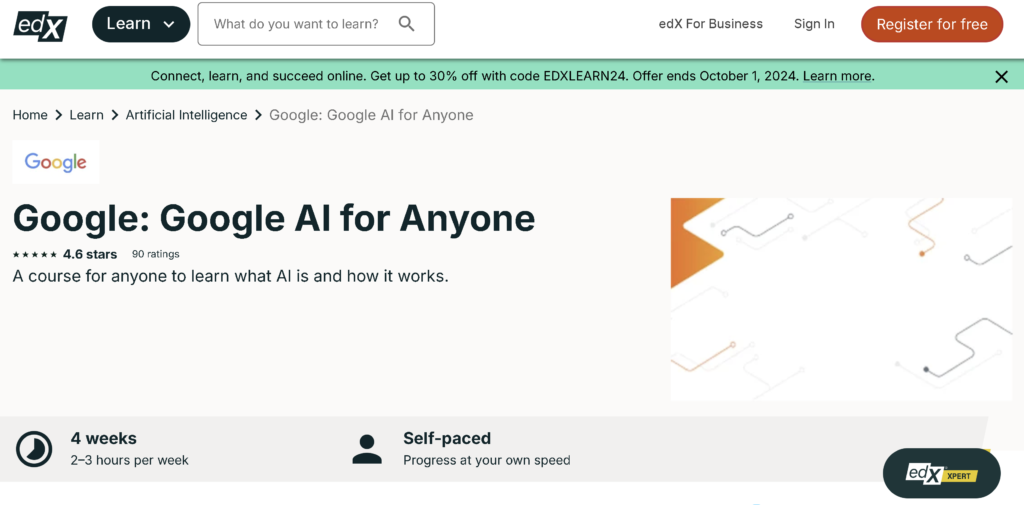
8. Introduction to AI by IBM (Coursera).
- Institution: IBM
- Key Topics: Neural networks, AI applications, deep learning.
- Duration: 5 weeks
- Description: IBM’s Introduction to AI course covers the fundamentals of neural networks, deep learning, and practical AI applications in various industries. It’s ideal for beginners looking to get started with AI.
- Format: Video lectures, hands-on labs, and quizzes.
- Certification: A certificate is available upon completion for a fee.
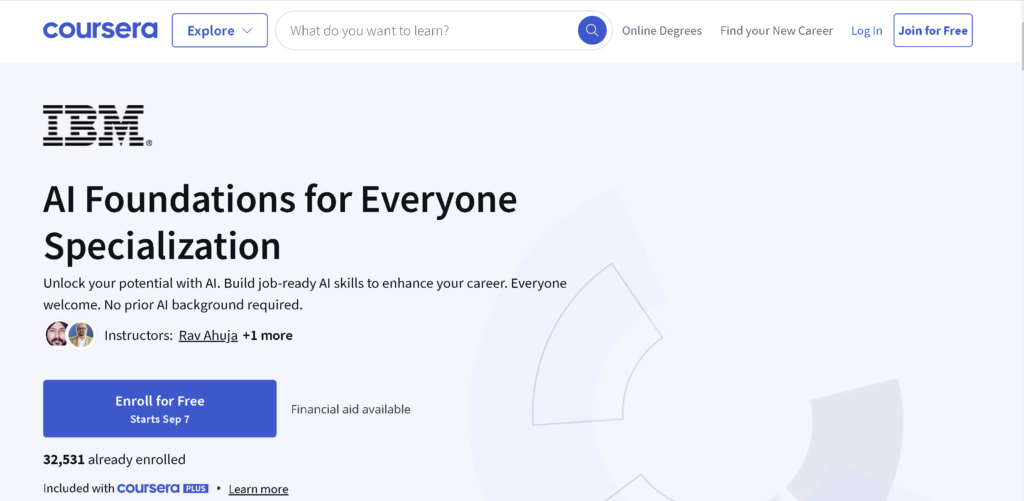
9. AI For Everyone by Coursera (offered by Andrew Ng).
- Institution: Coursera (Andrew Ng)
- Key Topics: AI fundamentals, AI applications in business.
- Duration: 6 weeks
- Description: This non-technical course is perfect for those who want to understand how AI works and its impact on business. Taught by AI expert Andrew Ng, it’s a must for business professionals looking to harness AI.
- Format: Videos, quizzes, and readings.
- Certification: Available for a fee after course completion.
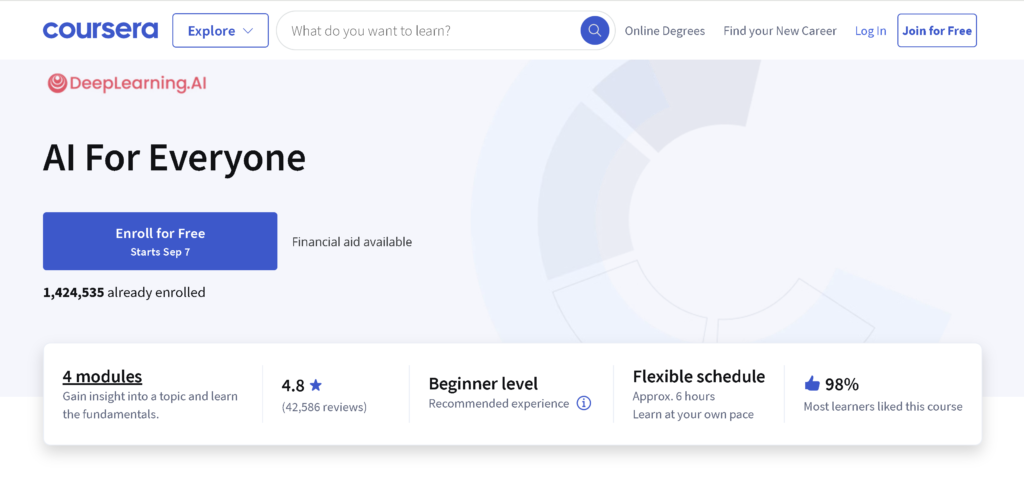
10. Deep Learning Specialization by Coursera.
- Institution: Coursera
- Key Topics: Deep learning, neural networks, and natural language processing.
- Duration: 4 months
- Description: Focused on deep learning techniques, this course dives into neural networks and natural language processing, providing hands-on experience for those looking to specialize in AI.
- Format: Video lessons, projects, and assignments.
- Certification: Verified certificates are available upon completion.
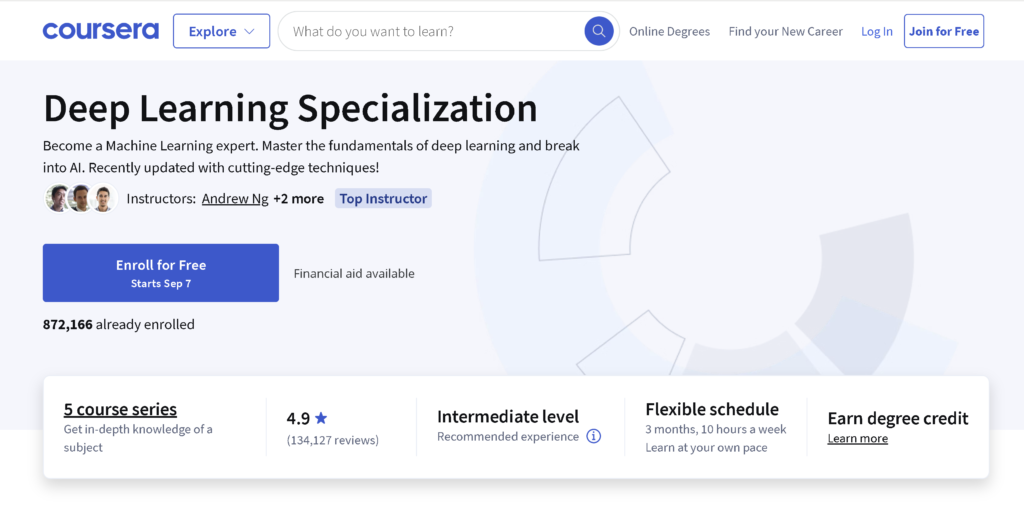
These free AI courses provide a big chance to learn about Artificial Intelligence and machine learning skills with flexible scheduling, hands-on projects, and no application or materials fees to apply. Perfect for anyone interested in advancing their skills in the quickly growing sector of AI. They will help you stay ahead of the curve in AI, whether you are a beginner or an experienced professional looking to broaden your horizon.
3. Who Can Benefit from These AI Courses.
But this technology that is revolutionizing the face of our world known as Artificial Intelligence (AI) is fundamentally changing everything and everyone to the point where learning AI is crucial, irrespective of your educational background. Free AI courses are accessible both for beginners and job seekers looking to enhance or restart their career. Now let us delve into who will be the most benefited out of these AI courses.
1. Beginners and Students.
For those getting started with AI this will give you a solid base in machine learning, neural networks and data science. These are good if you’re a student in CS or crypto, for the purpose of gaining real-time skills.
2. Professionals Transitioning to AI.
The demand of AI is high across industries; whether you see it in healthcare, finance or tech industries. In particular, career changers are well suited taking courses through Stanford’s Machine Learning Specialization or IBM’s Introduction to AI which allow them to build a foundation and experience which allows individuals to go into careers such as machine-learning engineering or data scientist role.
3. Non-Technical Individuals.
Anything and anybody can benefit from a knowledge of what AI is. Training courses such as “AI for Everyone” by Andrew Ng, helps marketing and business pros understand that AI is now at the core of their fields.
4. Tech Professionals.
AI courses make you ready if you are in the tech field and additionally, learning skills such as deep learning and natural language processing skills will ensure that despite AI becoming more prominent in the tech industry, you are not left behind.
These are free AI courses are suitable for everyone regardless of your background or level. If you are a student, professional or just curious how much AI is going to take over the world, now would be an amazing time to put in research and learnings.
4. Advantages of Taking These Free AI Courses.
Artificial Intelligence is revolutionizing industries, and free AI courses are an excellent way to broaden your knowledge without any cost. Why would you miss any of these opportunities.
1. Accessibility: Stay at Home and Move at Your Own speed.
You can learn AI at anyplace and anytime with these online courses. So you can learn as much as you want and when you want even if that means balancing a job or other commitments alongside your studies.
2. Free of Charge: Free Top High-quality Education.
These courses, taught by leading institutions like MIT and Stanford are totally free which is a bargain to learn AI from top-notch universities. Additionally, you can learn some of the latest skills with no tuition fees.
3. Career Enhancement: High-Demand Skills.
AI skills are highly valued in many industries. Completing these courses can make your resume more unique and outstanding as well as open doors to roles such as AI engineer, data scientist, or machine learning expert, helping you stay competitive in the job market.
4. Networking Opportunities: Global AI Communities.
Ai can give access to worldwide networks of every sort. Its members have numerous opportunities that cater to different communities where you can discuss on forums, contribute in projects and network with professionals from same backgrounds making it a more double sided learning experience.
When you sign up for the free AI courses, it gives you the freedom of learning – learn to enhance your career prospects and be part of a global community without costing any money.
5. How to Choose the Right AI Course.
The demand continues to rise for AI, and selecting the appropriate course can be your golden ticket. So many of you will get confused on which course to choose right? Well , if you are looking to get into AI in any way (as a fresher looking for entry-level jobs or for work with related data tools/packages) selecting an appropriate course of AI could vary depending on your background, goals and the style of learning that suits you best! Check out this guide to figure it out.
1. Understand Your Background and Learning Goals.
- Beginners: New entrants should seek out introductory courses that are more simplified like Andrew Ng`s “AI for Everyone” or IBM’s “Introduction to AI”.
- Intermediate Learners: For those who have graduated and perhaps are working in a technical field, you would do well to look into classes that specifically cover machine learning or natural language processing.
- Advanced Learners: Professionals who have a programming background can go for advanced courses such as “Deep Learning Specialization” or Stanford’s Machine learning.
2. Beginner-Friendly vs. Advanced Courses.
- Beginner-Friendly: Even without experience or any requirements, you can start with AI basics. Great courses such as “AI for Everyone” and “Artificial Intelligence Foundations by Harvard are available.
- Advanced Courses: These are for the students looking to learn a bit higher-level concepts of machine learning like deep learning course, which needs programming knowledge. Examples of this are Coursera for “Deep Learning Specialization” or Stanford with its course called, simply “Machine Learning”.
3. Consider Course Format and Learning Style.
- Video-Based Learning: (best for visual learners; includes formal, structured classes similar to those on Coursera or other e-learning platforms):
- Project Based Learning: Courses like “Machine Learning” from Stanford offer coding projects for those of you who have a knack to learn by doing.
- Self-Paced vs. Instructor-Led: Pick for the ability to learn at their own pace or learning from instructors, respectively.
4. Look for Certifications and Credentials.
These courses can help you to improve your career by adding certifications (by institutions like Stanford and MIT) that show employers proof of the skills covered in these roles, making them more attractive candidates for AI-related opportunities.
There are a number of factors that go into choosing the Best Artificial Intelligence Course for you, such as what your current knowledge is like and where you see yourself learning it from. There is an AI course suited to every type of learner, whether you are a beginner or seeking advanced knowledge. And with the course of your choice, you are going to become a pro in Artificial Intelligence.

The rise of Artificial Intelligence is leading to big changes in every industry enabling all to have a lot many opportunities. As long as you are a beginner or a professional transitioning to AI roles, there is plenty of specialization course fit for your learning style and goals. Free AI courses offer unprecedented opportunity to learn from many of the biggest course creators in all of education and are already attracting millions as they aim to close each global digital skills gap on earth. By teaching yourself AI, you are safe from your job burning up in the near future and ready (and high value) for an upcoming age of technology.
7. FAQ.
What is the best AI course for beginners?
For beginners, “AI for Everyone” by Andrew Ng is an excellent starting point. It introduces the basic concepts of AI in an easy-to-understand way, requiring no technical background.
Are free AI courses really free?
Yes! Many of the top institutions like MIT, Stanford, and Google offer high-quality AI courses for free. However, if you want a certification, some
courses may charge a fee for the certificate.
How can I choose the right AI course?
Start by assessing your current knowledge and learning goals. If you’re a beginner, choose foundational courses. If you have programming experience, look for more advanced courses like “Machine Learning” by Stanford.
Can I get a job after completing free AI courses?
While free courses alone may not guarantee a job, they provide valuable knowledge and skills that employers seek in AI-related roles. Earning certificates from reputable courses can also boost your resume.
What skills will I learn from these AI courses?
Depending on the course, you’ll learn a range of skills, including machine learning, deep learning, neural networks, data science, and AI ethics. Courses often include hands-on projects, enabling you to apply your skills to real-world scenarios.
Do these courses offer practical experience?
Yes, many AI courses, especially advanced ones like Stanford’s “Machine Learning” or Coursera’s “Deep Learning Specialization,” offer hands-on projects and real-world applications to help you practice what you learn.
